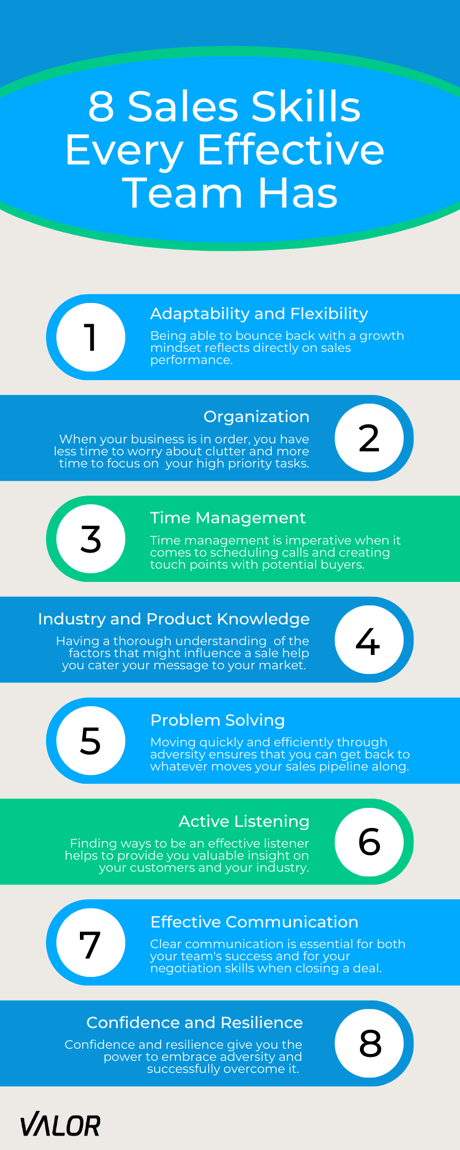- Valor Performance Blog
- 8 Sales Skills All Sales Representatives Need
8 Sales Skills All Sales Representatives Need
Sales is no easy career to master. Being in sales requires some true grit, regardless of the industry or company. Every sales professional must maintain a certain level of applicable sales skills to be successful. Among these, reliability, confidence, communication, and negotiation are all highly prevalent. And although several of these traits depend upon a salesperson’s personality, many of them can be learned and developed, which is why it’s paramount for professionals to work in an environment that practices growth as a mindset. It’s also the reason why managers that lead these high-intensity sales teams must be equipped with the necessary tools to proactively address challenges, evolve team member skills, and offer support when issues arise.
Skills to develop in your sales team
The key to developing a productive culture for an effective sales team begins with the team’s leaders. Having a manager that encourages growth, acknowledges employee performance, and practices thorough communication makes sales team members feel confident, motivated, and appreciated. It also poses a lasting impact on their performance and engagement, reflecting directly on the company’s culture and profitability. Lastly, any good sales manager will define methods and practices to help develop their employee’s skills so that they can become better salespeople for a thriving team. The following qualities listed are valuable skills that make up the most effective salespeople.

Adaptability & Flexibility
Everyone knows that working in sales is unpredictable. Closing a sale depends on several uncontrollable variables like economic trends and the potential buyer’s circumstances. There are also changing variables that don’t necessarily impact a sale directly but will cause foreseeable issues if not addressed, like technology updates or product/brand adjustments. It’s imperative that every salesperson is able to easily adapt when change occurs so they can shift their focus on the new matter and address it properly. It’s also worth recognizing that change, no matter how big or small, is an opportunity to learn and grow as a professional.
Organization
Staying organized is perhaps the most simple, yet effective trait to have as a salesperson. With so much pressure to perform, it’s easy to let things like your desk space or inbox become cluttered, leading to additional stress that could have otherwise been avoided if your time was prioritized more efficiently.
Time Management
Time management can be pretty detrimental in any job, but even more so in sales. It can quite literally make or break a deal. For example, if a lead comes in and you let too much time pass without responding, you might be unknowingly forfeiting a closed-won scenario.
Industry & Product Knowledge
Understanding what drives your potential buyers gives you a clear direction on how to sell a product or service. Additionally, knowing your product and how it stands out amongst competitors will create more unique selling points and convincing arguments. It also exemplifies your expertise; making your claims that much more credible.
Problem-Solving and Decision-Making
Are you familiar with the term decision fatigue? Decision fatigue can be described as the chaos experienced when you have conflicting viewpoints surrounding a decision. The time spent contemplating your options inhibits your brain and clouds your judgment, which is never a good headspace for making a tough decision. A salesperson that reaches a conclusion in a timely manner has a better chance of avoiding decision fatigue and resolving the issue that was initially presented; allowing them to proceed with other things on their to-do list.
Active Listening
When it comes to their customers, sales professionals that are active listeners have the advantage of better understanding their customer and their concerns; making it easier to create relationships and influence decisions.
Effective Communication
Having the ability to clearly communicate with your customers ensures that your product is being properly represented. In addition, thorough communication exudes confidence and will further reassure your buyer of the product’s quality; increasing your chances of efficiently navigating negotiation surrounding the sale.
Confidence & Resilience
When you doubt your abilities, it makes it difficult for others to trust them, which immediately sabotages a sale. Confidence is about being comfortable within yourself. Once confidence is established, the doubt you have in your abilities as well as the the fear of failure lessens. Confidence is also a leading factor in remaining resilient. A person with confidence is less likely to dwell on past failures and more likely to accept it, appreciate their attempt, and ultimately learn from it. And in a career like sales, resilience matters. Take cold calls for example. Rejection is going to happen more often than not and being able to move on from that rather than feel discouraged heavily impacts performance. It’s also the case for keeping clients in the pipeline. Timing isn’t always perfect, but recognizing that circumstances could change and checking back in with a prospect that’s previously rejected your efforts is often how deals are made.
Helping sales reps develop sales skills
Although the previous list is lengthy, it doesn’t mean that it’s unattainable– it’s actually quite the opposite. Developing and improving skills amongst your team and its members can be easily accomplished if the appropriate strategies are utilized.
Lead by example
Every successful manager practices what they preach. When you lead by example, your team is there for the success that accompanies your efforts; giving them another reason to strive for that skillset and perfect those techniques.
Set clear expectations
Every employee wants clear expectations from their manager. Having a precise understanding of what is required from you helps to avoid disappointment from both sides when the expectation is met.
Encourage continuous learning
When continuous learning is encouraged, failure and mistakes are viewed as opportunities, innovation is increased, and the company culture thrives.
Provide feedback
Providing feedback doesn’t have to be awkward. After all, feedback is necessary for professionals to grow. Be open and honest; knowing that you are contributing to their career development. Keep in mind that withholding feedback is not doing anyone any favors. In fact, by avoiding feedback, you would be doing both your employees and your team a disservice.
Tailor training to the individual
Understand where your employees lack skills and work with them to develop them. Odds are, they are fully aware of their shortcomings, and having the opportunity to overcome them will knowingly boost their confidence.
Provide coaching and resources
Resources like Valor Performance Coaching provide a confidential, external approach from an industry expert with an applicable background to walk leaders through challenges and map out a plan of action to resolve them. The best thing about Valor Performance Coaching is that every relationship between a Valor coach and a professional is customized based on the individual’s preferred areas of focus along with the company’s organizational goals.
Create opportunities for skill practice and application
Provide opportunities for your employees to apply what they’ve learned so that they can use their skills in real-world scenarios and continue to enhance them.
The importance of investing in developing salespeople
No one wants to remain complacent in their career. High-performing professionals are driven for the purpose of eventually advancing as a professional and moving up in the rankings. By investing in their skills, it’s evident that you believe in their abilities and want to see them succeed. Valor Performance Coaching helps develop sales skills for teams by utilizing a leader’s strengths and addressing their weaknesses with a growth mindset, improving the overall efficiency of the entire team.
Overcoming common challenges in sales coaching
Despite the countless benefits that occur as a result of sales coaching, It’s not uncommon to experience challenges when establishing employee development opportunities. For example, you could face resistance to change or concerns might be raised about time constraints. Some employees may lack the motivation to participate.
In any case, it’s important to reiterate the reason for implementing these programs– that sales coaching and leadership development will improve both their personal and professional lives. Encourage feedback and address any concerns that employees express. At the end of the day, leadership development, like sales coaching, is an investment, not only for the success of your business but also for the personal success of your employees.
Development opportunities have been proven to increase employee engagement, decrease turnover, and improve culture. The difference that these skills make in a sales professional’s performance is substantial. Which makes each and every employee worth the investment. Not to mention Valor Performance Coaching provides companies with analytics, metrics, and benchmarks to ensure progress & alignment with company goals. Discover the rewards that Valor Performance Coaching could do for your sales team and your bottom line.


